TRIPURA, India – The Northeastern section of India consists of seven states: Tripura, Assam, Nagaland, Meghalaya, Manipur, Arunachal Pradesh and Sikkim. These states, known as the “seven sisters,” are rich with beauty and natural resources. Tea and jute plantations, which extend throughout this lush land, are basic to the economy there. However for the last 14 years all of these states have been facing far-right extremism and terrorism.
Among the worst affected is Tripura, where extremist groups like, All Tripura Tribal Force (TNV) and National Liberation Front of Tripura (NLFT), use violence and terror to divide Tripura’s population. The main division comes between tribals, who are the majority and non-tribals, who are mainly Bengali-speaking Hindus.
The Tripura state government, led by Communist Party of India (Marxist)-(CPM) leader Manik Sarkar, is trying its best to end this multi-faceted ethnic problem. But, from the beginning, these extremist groups have been targeting the left, especially CPM workers, using terrorism and violence. Forty-five CPM cadres were killed since the beginning of the year. On Jan. 26, NLFT fired indiscriminately to a CPM election rally in west Tripura and killed 11 persons including five women. On Feb. 4 the same group killed a CPM worker and his five-year-old grand child.
With the announcement of the assembly elections, the armed extremist gangs have stepped up their activities targeting CPM workers and supporters. The CPM had already approached the Election Commission requesting that adequate security forces be deployed given the special situation in the state. Tripura state assembly election will be held on Feb. 27. Early trends suggest that CPM-led government will be re-elected. Hundreds of cadres from both CPM and Communist Party of India (CPI) are now engaged in election work, seeking to block the far-right Hindu nationalists from entering the state assembly.
The CPM has been very critical of the Congress Party for working in coalition with the Indigenous Nationalist Party of Tripura (INPT) against the left. The INPT supports the same aims as the outlawed terrorist group, NLFT.
Equality for tribal peoples has been a part of the communist movement’s program and history. Communists organized around issues such as land distribution and the lack of access to forests, which are key to the survival of the tribal peoples, along with language and cultural rights. Under the left-led Tripura government land ceiling and reform laws were enacted and more than 7,000 acres had been restored to tribal people, However left parties oppose NLFT’s and INPT’s demand for a separate tribal land.
Now extremists among the non-tribals are also taking arms in their hands. United Bengali Liberation Front of Tripura (UBLFT) is such an organization.
Tripura and Bangladesh share an 856k-long border with Bangladesh on three sides of the state. A number of terrorist training camps function in Bangladesh with help of Inter Services Intelligence (ISI) of Pakistan and the Bangladesh government. Bangladesh receives millions of dollars in U.S. military aid each year.
The NLFT operates from Dhaka, the capital of Bangladesh. Cox Bazaar, a port town in Bangladesh is NLFT’s weapon transit point. NLFT president Biswa Mohan Deb Barma lives in Chittagong, Bangladesh, in a government-owned housing colony well equipped with mobile phones, computer networks and satellite televisions.
The right-wing BJP-led government in Delhi is doing nothing to tackle the terrorist situation in Tripura. The fervent pleas of the state government for additional forces have been ignored. Nor has the Centre helped in the development of the state. The absence of which becomes a breeding ground for disaffection.
There is an urgent need for the deployment of adequate security forces along the Indo-Bangladesh border and forthright diplomacy with the government of Bangladesh to dismantle the training camps situated there.
The author can be reached at pww@pww.org









